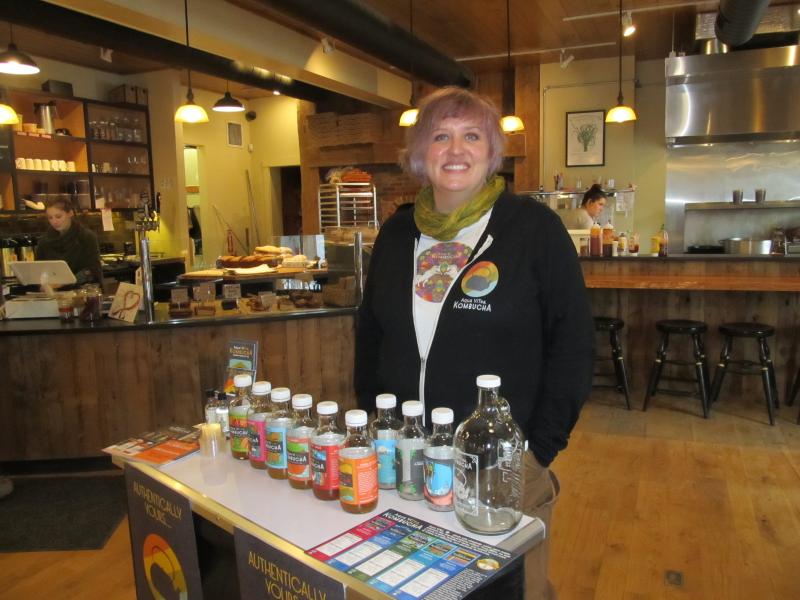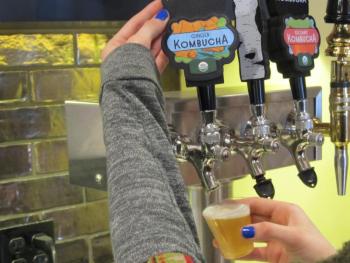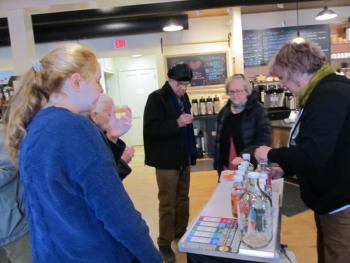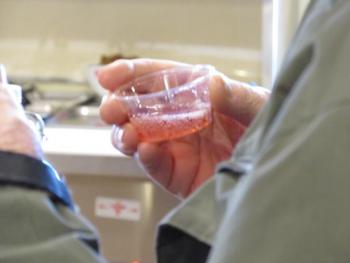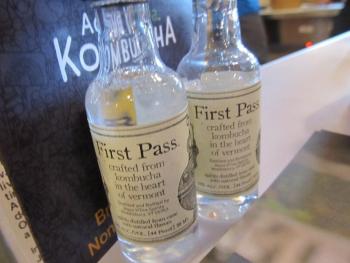Once known as “the tea of immortality,” Kombucha, a fermented brew thought to be invented by the Chinese more than 2,000 years ago, is experiencing a revival in Maine, and not just for the wellness crowd.
Last winter, a number of curious customers flocked to Lincolnville General Store to find out what Kombucha tastes like courtesy of a free tasting offered by Aqua ViTea, a Kombucha producer in Middlebury, Vermont. Aqua ViTea supplies Lincolnville General Store Kombucha on tap and in bottles as well as to a number of Maine stores.
Kombucha is made by introducing a SCOBY (symbiotic colony of bacteria and yeast) a globby, unappealing whitish mass, into the black or green tea that serves as the engine to starting the fermentation process. The SCOBY eats the sugars in the brew, producing a fizzy, tangy taste and after it is strained out, the second fermentation can begin with the addition of spices, fruits and herbs for more flavor.
Kombucha, known chiefly for being a rich source of probiotics, (and great for people with poor gut health) has also been found to contain antioxidants that combat free radicals and reactive molecules that damage cells, according to new studies published by Healthline.com. In addition, it has strong anti-bacterial properties that fight against infection-causing bacteria, making it a superhero of health drinks.
As many home brewers know, once yeast eats sugars, the process produces a small amount of alcohol in kombucha—anywhere from 0.5 to 2 percent. (For reference, a Budweiser has 5 percent alcohol).
Prior to 2010 while kombucha was enjoying a renaissance, the fermented drink wasn’t on anyone’s radar for being over the legal level of alcohol, until, as this 2017 Forbes article attests, a Maine Department of Agriculture Consumer Protection Inspector Randy Trahan was taking a walk around Whole Foods in Portland one day in 2010, when he noticed that some of the kombucha bottles on the shelf were leaking.
Finding that suspicious, Trahan “submitted a few of the store's bottles for testing at the Food Sciences Lab at the University of Maine, where it was discovered that the bottles contained alcohol levels ranging from slightly over 0.5 percent to over 2.5 percent, which was well above the Alcohol and Tobacco Tax and Trade Bureau's regulation that labeled non-alcoholic beverages must contain less than 0.5 percent ABV.”
After that analysis, Whole Foods had to remove all of its kombucha products from the shelves and on tap, prompting the Alcohol and Tobacco Tax and Trade Bureau to update its guidelines announcing that it would regulate any kombucha products that contain 0.5 percent or more ABV. While the entire industry of kombucha producers struggled to figure out a way to comply with the new guidelines by manufacturing the drink differently, others whose formulas crept above 0.5 percent, decided to re-brand it as alcoholic kombucha.
The same problem for Maine manufacturers presented an obstacle for Aqua ViTea’s founder, Jeff Weaber, when the Vermont Department of Liquor Control and the federal Alcohol and Tobacco Tax and Trade Bureau raided his fledgling brewery in 2008, determining that the alcohol content was too high in the probiotic elixir.
So, after spending millions in R&D to correct the problem, they chanced upon an ideal solution: distilling the alcohol out of the Kombucha and making their own vodka from it. Pairing up with Appalachian Gap, a distillery in Middlebury, Vermont, Weaber worked with the distillery to make Aqua Vodka, 88-proof and certified organic, from the alcohol by-product of Weaber's Kombucha.
A win-win for everyone, but for those who prefer their kombucha under the legal limit, there are two places to try Aqua ViTea on tap: at Lincolnville General Store and the Belfast Co-op.
Kay Stephens can be reached at news@penbaypilot.com


